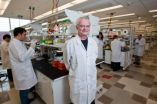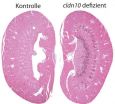New insights into why humans are more susceptible to cancer and other diseases
2012-08-23
(Press-News.org) Chimpanzees rarely get cancer, or a variety of other diseases that commonly arise in humans, but their genomic DNA sequence is nearly identical to ours. So, what's their secret? Researchers reporting in the September issue of the American Journal of Human Genetics, a Cell Press journal, have found that differences in certain DNA modifications, called methylation, might play a role.
The researchers discovered hundreds of genes that display different patterns of methylation between the two species. These different patterns of methylation lead to different levels of expression, and many of the genes involved are linked to specific human diseases. Given that environmental factors can affect DNA methylation, these results might help researchers to better understand how differences in genetics and environmental exposure contribute to differences, including different disease vulnerabilities, between the two species.
DNA methylation doesn't change a cell's underlying genetic information, but it does affect gene activity and can have a profound impact on processes such as aging and the development of disease. By using new state-of-the-art techniques to look at methylation maps and gene expression in the brains of chimpanzees and humans, the investigators found that changes in DNA methylation at least partially explain the divergence of gene-expression patterns between these species.
In addition, differentially methylated genes showed striking links with specific neurological and psychological disorders and cancers to which modern humans are particularly susceptible, suggesting that changes in DNA methylation might be linked to the evolution of humans' vulnerability to certain diseases.
"Our results hint, but by no means provide proof, that epigenetic divergence—or changes of chemical properties of DNA—may be particularly important for some disease-related phenotypes that are pertinent to modern humans," says senior author Dr. Soojin Yi, from the Georgia Institute of Technology. "Such findings, in the long-term, may contribute to the development of better therapeutic targets for some human diseases," she adds.
###
Zeng et al.: "Divergent Whole-Genome Methylation Maps of Human and Chimpanzee Brains Reveal Epigenetic Basis of Human Regulatory Evolution."
END
ELSE PRESS RELEASES FROM THIS DATE:
2012-08-23
Rather than trying to kill bacteria outright with drugs, Université de Montréal researchers have discovered a way to disarm bacteria that may allow the body's own defense mechanisms to destroy them. "To understand this strategy one could imagine harmful bacteria being like Darth Vader, and the anti-virulence drug would take away his armor and lightsaber," explained Dr. Christian Baron, the study's lead author and Professor at the Department of Biochemistry. "A naked Darth Vader would be an easy target and similarly, pathogenic bacteria without their virulence factors would ...
2012-08-23
PHILADELPHIA—It's widely accepted that molecular mechanisms mediating epigenetics include DNA methylation and histone modifications, but a team from Thomas Jefferson University has evidence to the contrary regarding the role of histone modifications.
A study of Drosophila embryos from Jefferson's Department of Biochemistry and Molecular Biology published ahead of print in Cell August 23 found that parental methylated histones are not transferred to daughter DNA. Rather, after DNA replication, new nucleosomes are assembled from newly synthesized unmodified histones.
"Essentially, ...
2012-08-23
People will reject an offer of water, even when they are severely thirsty, if they perceive the offer to be unfair, according to a new study funded by the Wellcome Trust. The findings have important implications for understanding how humans make decisions that must balance fairness and self-interest.
It's been known for some time that when humans bargain for money they have a tendency to reject unfair offers, preferring to let both parties walk away with nothing rather than accept a low offer in the knowledge that their counterpart is taking home more cash.
In contrast, ...
2012-08-23
HOUSTON, Aug. 23, 2012 – Scientists at the University of Houston (UH) have discovered what may possibly be a key ingredient in the fight against Parkinson's disease.
Affecting more than 500,000 people in the U.S., Parkinson's disease is a degenerative disorder of the central nervous system marked by a loss of certain nerve cells in the brain, causing a lack of dopamine. These dopamine-producing neurons are in a section of the midbrain that regulates body control and movement. In a study recently published in the Proceedings of the National Academy of Sciences (PNAS), ...
2012-08-23
The discovery of a 'switch' that modifies a gene known to be essential for normal heart development could explain variations in the severity of birth defects in children with DiGeorge syndrome.
Researchers from the Walter and Eliza Hall Institute made the discovery while investigating foetal development in an animal model of DiGeorge syndrome. DiGeorge syndrome affects approximately one in 4000 babies.
Dr Anne Voss and Dr Tim Thomas led the study, with colleagues from the institute's Development and Cancer division, published today in the journal Developmental Cell.
Dr ...
2012-08-23
Sodium chloride, better known as salt, is vital for the organism, and the kidneys play a crucial role in the regulation of sodium balance. However, the underlying mechanisms of sodium balance are not yet completely understood. Researchers of the Max Delbrück Center for Molecular Medicine (MDC) Berlin-Buch, Charité – Universitätsmedizin Berlin and the University of Kiel have now deciphered the function of a gene in the kidney and have thus gained new insights into this complex regulation process (PNAS Early Edition, doi/10.1073/pnas.1203834109)*.
In humans, the kidneys ...
2012-08-23
They are one of the most destructive forces of nature on Earth, but now environmental scientists are working to tame the hurricane. In a paper, published in Atmospheric Science Letters, the authors propose using cloud seeding to decrease sea surface temperatures where hurricanes form. Theoretically, the team claims the technique could reduce hurricane intensity by a category.
The team focused on the relationship between sea surface temperature and the energy associated with the destructive potential of hurricanes. Rather than seeding storm clouds or hurricanes directly, ...
2012-08-23
Vancouver, BC – August 23, 2012 – Vancouver-based clinician and researcher Dr. Andrei Krassioukov is packing for the upcoming Paralympic games in London. Rather than packing sports equipment, he has a suitcase full of advanced scientific equipment funded by the Canada Foundation for Innovation that he will use to monitor the cardiovascular function of athletes with spinal cord injuries.
Up to 90% of people with injuries between that cervical and high thoracic vertebrae suffer from a condition that limits their ability to regulate heart rate and blood pressure. For top-level ...
2012-08-23
Scientists at the University of Cambridge have produced hydrogen, H2, a renewable energy source, from water using an inexpensive catalyst under industrially relevant conditions (using pH neutral water, surrounded by atmospheric oxygen, O2, and at room temperature).
Lead author of the research, Dr Erwin Reisner, an EPSRC research fellow and head of the Christian Doppler Laboratory at the University of Cambridge, said: "A H2 evolution catalyst which is active under elevated O2 levels is crucial if we are to develop an industrial water splitting process - a chemical reaction ...
2012-08-23
CAMBRIDGE, MA -- The discovery of graphene, a material just one atom thick and possessing exceptional strength and other novel properties, started an avalanche of research around its use for everything from electronics to optics to structural materials. But new research suggests that was just the beginning: A whole family of two-dimensional materials may open up even broader possibilities for applications that could change many aspects of modern life.
The latest "new" material, molybdenum disulfide (MoS2) — which has actually been used for decades, but not in its 2-D ...
LAST 30 PRESS RELEASES:
[Press-News.org] New insights into why humans are more susceptible to cancer and other diseases

